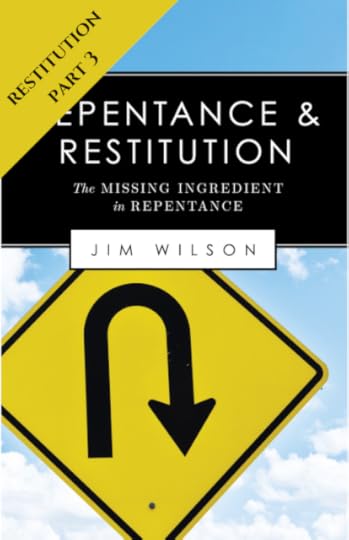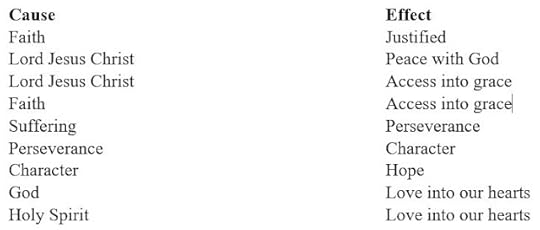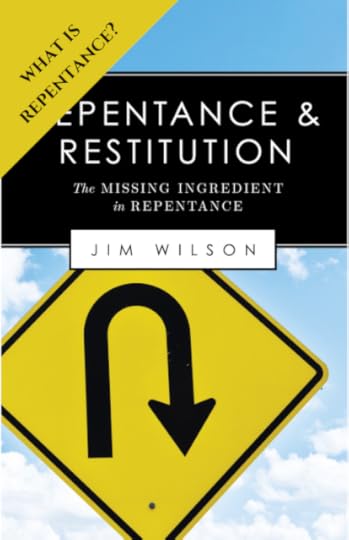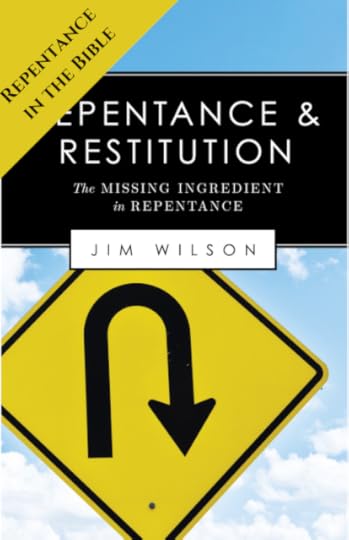Jim Wilson's Blog, page 29
March 20, 2023
The Lord Is Near

“Let your gentleness be evident to all. The Lord is near. Do not be anxious about anything, but in everything, by prayer and petition, with thanksgiving, present your requests to God. And the peace of God, which transcends all understanding, will guard your hearts and your minds in Christ Jesus” (Philippians 4:5-7).
At different times in my life, this paragraph has had both immediate and long-term results. As I look at it again today,* every word seems to be charged. Here are a few words from the paragraph to focus on to aid your study and your meditation: gentleness; anxious; thanksgiving; transcends; guard. I think you will find this method of study and meditation—concentrating on certain word—to be a major help in your Christian life.
*Written October 1988.
This post coordinates with tomorrow's reading in the To the Word! Bible Reading Challenge. If you are not in a daily reading plan, please join us at TotheWord.com. We would love to have you reading with us.
How To Be Free From Bitterness and other essays on Christian relationshipsMarch 15, 2023
Restitution: The Missing Ingredient in Repentance, Part 3 of 3

Restitution is for people under grace. Here’s why. Suppose I am not a Christian and am short of money. So I go into the First National Bank and hold it up. I put $100,000 in my bag and walk down the street. I come to a park where there is open-air preaching going on. There is singing, testifying, and preaching, and a crowd of people listening. I join the crowd. I am convicted of sin and call on the Lord.
After the meeting, I go up to the preacher and say, “I did what you said. I prayed to God. I feel wonderful! What does that mean?”
The preacher says, “That means you have been born again.”
“What does that mean?”
“It means your sins have been forgiven.”
“Oh,” I say. “How many?”
“All of them!”
“All of them?”
“Yes, all of them.”
“Oh boy,” I reply. “Now I can enjoy this $100,000.”
“What $100,000?”
“In my bag. I just relieved the bank of some extra money.”
The preacher looks at me. “Let’s take it back.”
“What do you mean, ‘Take it back’? You just told me I’ve been forgiven.”
“Yes, but it is not your money. You were forgiven for stealing it, but when you decided to keep it, you just stole it again.”
You may think that needing to return it is obvious. Yes—because it is $100,000, and the theft happened less than an hour before the repentance. But what if it is a candy bar you took twenty years ago? The amount stolen and the time since the theft do not make it yours. Take it back!
There are many Christians who are living subnormal Christian lives because they are too proud or too afraid to make restitution. They are like people with low-grade fevers; they are not sick enough to be in bed, but too sick to do anything worthwhile. Even if no one knows about the thefts, these Christians are poor witnesses for Jesus Christ. They may have confessed and repented in words, but if they do not make restitution, it is not true repentance, and they are not forgiven. When Christians act on this truth, there will be a revival in their own lives. When many Christians do it, there will be revival in the city, the state, and the country.
Excerpted from Repentance & Restitution—the Missing Ingredient in Repentance , available at ccmbooks.org and Amazon.com.
How To Be Free From Bitterness and other essays on Christian relationshipsMarch 13, 2023
Ask the Lord of the Harvest

“Therefore, since we have been justified through faith, we have peace with God through our Lord Jesus Christ, through whom we have gained access by faith into this grace in which we now stand. And we rejoice in the hope of the glory of God. Not only so, but we also rejoice in our sufferings, because we know that suffering produces perseverance; perseverance, character; and character, hope. And hope does not disappoint us, because God has poured out his love into our hearts by the Holy Spirit, whom he has given us" (Romans 5:1-5).
This is a paragraph of causes and effects.

There is another list of causes and effects in Romans 10, where the list is given in rhetorical questions. "How, then, can they call on the one they have not believed in? And how can they believe in the one of whom they have not heard? And how can they hear without someone preaching to them? And how can they preach unless they are sent? As it is written, 'How beautiful are the feet of those who bring good news!’ …. Consequently, faith comes from hearing the message, and the message is heard through the word of Christ” (Romans 10:14-15, 17).
This wonderful succession of causes and effects started with the Father, continued with the Son in His death and resurrection, and continues in the present through the Holy Spirit and redeemed people sent to proclaim Jesus Christ.
"When he saw the crowds, he had compassion on them, because they were harassed and helpless, like sheep without a shepherd. Then he said to his disciples, ‘The harvest is plentiful but the workers are few. Ask the Lord of the harvest, therefore, to send out workers into his harvest field’” (Matthew 9:36-38). The crowds are bigger now than they were then. They are still helpless, shepherdless. Jesus said to ask.
Written January 1991.
This post coordinates with today's reading in the To the Word! Bible Reading Challenge. If you are not in a daily reading plan, please join us at TotheWord.com. We would love to have you reading with us.
How To Be Free From Bitterness and other essays on Christian relationshipsMarch 8, 2023
The Connection Between Kindness & Repentance

“Or do you show contempt for the riches of His kindness, tolerance and patience, not realizing that God's kindness leads you toward repentance?" (Rom. 2:4).
That is an understatement; men do not realize the connection between kindness and repentance. In this culture, we think of repentance responding to a harsh message, not a kind one. Notice the correlation in 2 Timothy 2:24-25:
“And the Lord’s servant must not quarrel; instead, he must be kind to everyone, able to teach, not resentful. Those who oppose him he must gently instruct, in the hope that God will grant them repentance, leading them to a knowledge of the truth.”
Written September 1985.
This post coordinates with tomorrow's reading in the To the Word! Bible Reading Challenge. If you are not in a daily reading plan, please join us at TotheWord.com. We would love to have you reading with us.
How To Be Free From Bitterness and other essays on Christian relationshipsMarch 6, 2023
A Fool's Opinions

"He who is estranged seeks pretexts to break out against all sound judgment. A fool takes no pleasure in understanding but only in expressing his opinion” (Proverbs 18:1-2).
When I am estranged or separated from the Lord in fellowship, the last thing I want to hear is sound judgment. I will barricade myself against it. But since I cannot barricade against sound judgment with sound judgment, I must do it with pretexts—shallow, surface, weak things which deceive only me. It is my attempt to stay estranged. If the searchlight of sound judgment breaks into my hideout, I find myself confessing, forsaking, and no longer estranged but restored to the Lord.
During my estrangement, I take no pleasure in understanding, but I am very eager to express my opinion. After I am back in fellowship, I am amazed how stupid I was with my opinions. How I regret my big mouth. Truly it is foolish.
Written January 1986.
This post coordinates with today's reading in the To the Word! Bible Reading Challenge. If you are not in a daily reading plan, please join us at TotheWord.com. We would love to have you reading with us.
How To Be Free From Bitterness and other essays on Christian relationshipsMarch 3, 2023
Restitution: The Missing Ingredient in Repentance, Part 2 of 3

Is restitution also required in the New Testament? Yes. Zacchaeus returned fourfold to the people he had cheated. Restitution is repentance in action. Repentance is more than just a word.
“Jesus said to him, ‘Today salvation has come to this house, because this man, too, is a son of Abraham. For the Son of Man came to seek and to save what was lost’” (Luke 19:9-10).
David knew this truth when he responded to Nathan’s story of the rich man who stole his poor neighbor’s pet lamb to feed his guest: “David burned with anger against the man and said to Nathan, ‘As surely as the LORD lives, the man who did this deserves to die! He must pay for that lamb four times over, because he did such a thing and had no pity’” (2 Samuel 12:5-6).
What if we cannot find the person we stole from?
“The LORD said to Moses, ‘Say to the Israelites: “When a man or woman wrongs another in any way and so is unfaithful to the LORD, that person is guilty and must confess the sin he has committed. He must make full restitution for his wrong, add one fifth to it and give it all to the person he has wronged. But if that person has no close relative to whom restitution can be made for the wrong, the restitution belongs to the LORD and must be given to the priest, along with the ram with which atonement is made for him”’” (Numbers 5:5-8).
If the original owner or his relatives cannot be found, make restitution to the Lord.
One Sunday after teaching on this, I was approached by a student and his wife. They wanted to see me urgently, so I made an appointment to see them at my home that afternoon. When they arrived, I asked what the problem was. The conversation went something like this:
Student: “It is what you talked about this morning.”
Me: “Wasn’t it clear? Didn’t you understand?”
Student: “Yes.”
Me: “Then why do you need to see me? You know what to do.”
Student: “Let me tell you anyway. I stole seventy rock music tapes that cost $6.99 each. I do not like that kind of music anymore, so I threw them away. I’ve got a leather fringe coat that I don’t wear anymore because it bothers my conscience to wear it. I have a pair of gym shoes I found at the boat races in the Tri-Cities; I have a basketball that I got from the men’s gym; I stole a bicycle ten years ago in Spokane.”
Me: “What is your problem? You know what to do.”
Student: “I don’t have any money.”
Me: “What are you and your wife living on if you do not have any money?”
Student: “The money I earned last summer. I have it budgeted for the rest of the school year.”
Me: “Oh. You do have money, but it is not your money. It belongs to the people you stole it from.”
Later he told me the success of the restitution.
Another student had been a heavy-equipment driver for a construction company. At the beginning of the summer, he had told his boss that he planned on going back to college in the fall. When he came to work the next day, the boss told him, “Since you are leaving in the fall, just don’t come back tomorrow.”
The student was angry that the boss had only given him one day’s notice when he had given the boss three months’ notice. He figured that the company owed him something, so he took a few tools with him. In the fall, he heard the message on restitution and realized he had to return the tools. At Christmas, he put the tools in his car. While driving to the construction company, he was listening to Christian radio. The Bible teacher on the radio said that restitution was an Old Testament concept and that people under grace did not have to return things.
He was so glad! He turned around and went home. Then he put his initials on the tools. Later he was again convicted by the Holy Spirit. This time he had to take the tools back with his initials on them.
To be continued on March 15.
Excerpted from Repentance & Restitution—the Missing Ingredient in Repentance , available at ccmbooks.org and Amazon.com.
How To Be Free From Bitterness and other essays on Christian relationshipsMarch 1, 2023
Restitution: The Missing Ingredient in Repentance, Part 1 of 3

In 1932 when I was in kindergarten, I was walking home with a friend after school one day, and he told me that he would teach me how to steal a cookie. He was to stop at the corner store on the way home to buy a pound of hamburger. When he ordered the hamburger, the owner of the store would go to the back room to grind and wrap it. While the owner was doing that, my friend would go to the cookie display and open a small glass door over a bin of cookies. He would remove two chocolate marshmallow cookies, give one to me, and put the other in his own pocket. He would pay the merchant for the hamburger, and we would leave the store. Sure enough, it went just as planned.
The corner store was two blocks from my home. In the first block, each of us ate our cookie. In the second block, I could feel the chocolate and marshmallow around my mouth. I licked my lips and rubbed my face. I knew my mother would see my mouth and ask where I got the chocolate. Well, she did not ask.
Fifteen years later during my second year at the U.S. Naval Academy, I received Christ. My sins were forgiven. I had new life in Christ. Sometime later while on leave, I stopped by the corner store at 24th and Oak Street in South Omaha to make restitution for that stolen cookie. The store was no longer there. I gave the money to the Lord.
All sins require repentance. Some of those sins also require restitution. The most common kind of sin that requires restitution is theft. Leviticus 6:1-7 lists the forms of stealing:
“The LORD said to Moses: “If anyone sins and is unfaithful to the LORD by deceiving his neighbor about something entrusted to him or left in his care or stolen, or if he cheats him, or if he finds lost property and lies about it, or if he swears falsely, or if he commits any such sin that people may do—when he thus sins and becomes guilty, he must return what he has stolen or taken by extortion, or what was entrusted to him, or the lost property he found, or whatever it was he swore falsely about. He must make restitution in full, add a fifth of the value to it and give it all to the owner on the day he presents his guilt offering. And as a penalty he must bring to the priest, that is, to the LORD, his guilt offering, a ram from the flock, one without defect and of the proper value. In this way the priest will make atonement for him before the LORD, and he will be forgiven for any of these things he did that made him guilty.”
After giving the different kinds of stealing, the passage tells the solution, the means of forgiveness for the one who stole:
1) Return what he stole.
2) Add 20% of the value and give that also to the person he stole from.
3) Bring a guilt offering to the Lord.
When these are done, the thief receives atonement and forgiveness for his guilt.
That is Old Testament. What about in the New Testament? First, Jesus’ death on the cross is the fulfillment of all Old Testament sacrifices:
“Unlike the other high priests, he does not need to offer sacrifices day after day, first for his own sins, and then for the sins of the people. He sacrificed for their sins once for all when he offered himself” (Hebrews 7:27).
Jesus’ death paid for the sins, the guilt, the death, and the punishment. Jesus does not repay the man who got ripped off. The person who comes to the Lord in repentance is to pay the one he stole from the value of the stolen goods plus one fifth (20%).
There are other cases where the percentage is 300 or 400%.
“If a man steals an ox or a sheep and slaughters it or sells it, he must pay back five head of cattle for the ox and four sheep for the sheep” (Exodus 22:1).
Here God is telling Moses detailed instructions to give the people. This is one of them. The restitution for live animals is much different from the 20% instructed in Leviticus. Why is this?
An ox is a mammal which first reproduces, then gives milk, cheese, butter, meat, and leather. A castrated male pulls the plow to produce crops. The ox is its owner’s means of income. Therefore, it is to be returned plus four more (400%) to make up for the income which was lost when it was stolen.
A sheep is a ruminous mammal that produces more sheep, wool, and meat. It is also a means of income and must be returned plus three more sheep (300%).
To be continued on Friday.
Excerpted from Repentance & Restitution—the Missing Ingredient in Repentance , available at ccmbooks.org and Amazon.com.
How To Be Free From Bitterness and other essays on Christian relationshipsFebruary 27, 2023
Teach to Obey

“For Ezra had set his heart to study the law of the Lord, and to do it, and to teach his statutes and ordinances in Israel” (Ezra 7:10).
Notice three things: study, do, teach.
In the Christian church, we have studiers and teachers. We can study and acquire information. We can teach and impart information. We can get As on our knowledge. The strong point of the three is the doing. Doing validates the studying and validates the teaching.
Teaching biblically is not just imparting information. The neglected phrase in the Great Commission is the one on teaching: “teaching them to do all that I have commanded you" (Matthew 28:20). Jesus gave the commands. We do not command. We teach obedience to His commands. We are not to teach information without teaching obedience. If we are to follow Ezra's example, we are to study, obey, and teach to obey.
Written February 1989.
This post coordinates with tomorrow's reading in the To the Word! Bible Reading Challenge. If you are not in a daily reading plan, please join us at TotheWord.com. We would love to have you reading with us.
How To Be Free From Bitterness and other essays on Christian relationshipsFebruary 22, 2023
What is Repentance?

Repentance is turning from evil and turning toGod.
“Turn now, each of you, from your evil ways and your evil practices, and you can stay in the land the LORD gave to you and your fathers for ever and ever” (Jeremiah 25:5).
“When God saw what they did and how they turned from their evil ways, he had compassion and did not bring upon them the destruction he had threatened” (Jonah 3:10).
“I preached that they should repent and turn to God and prove their repentance by their deeds” (Acts 26:20b).
“Repent, then, and turn to God, so that your sins may be wiped out, that times of refreshing may come from the Lord” (Acts 3:19).
“I have declared to both Jews and Greeks that they must turn to God in repentance and have faith in our Lord Jesus” (Acts 20:21).
Repentance is caused by the kindness of God and godly sorrow.
“Or do you show contempt for the riches of his kindness, tolerance and patience, not realizing that God’s kindness leads you toward repentance?” (Romans 2:4).
“Godly sorrow brings repentance that leads to salvation and leaves no regret, but worldly sorrow brings death” (2 Corinthians 7:10).
God’s kindness causes us to turn to Him. Godly sorrow is an emotion about our evil ways, which causes us to turn from them. Continued sorrow or remorse has no virtue; it is worldly. With this kind of sorrow we will die in our remorse, not saved.
The New Testament describes repentance toward God with several different verbs:
“Yet to all who received him, to those who believedin his name, he gave the right to become children of God—children born not of natural descent, nor of human decision or a husband’s will, but born of God” (John 1:12-13).
“Come to me, all you who are weary and burdened, and I will give you rest. Take my yoke upon you and learn from me, for I am gentle and humble in heart, and you will find rest for your souls” (Matthew 11:28-29).
“Everyone who calls on the name of the Lord will be saved” (Romans 10:13).
“I am sending you to them to open their eyes and turn them from darkness to light, and from the power of Satan to God, so that they may receive forgiveness of sins and a place among those who are sanctified by faith in me” (Acts 26:17-18).
“I have declared to both Jews and Greeks that they must turn to God in repentance and have faith in our Lord Jesus” (Acts 20:21).
These verbs (receive, believe, come, take, call, repent, turn) are not synonyms. However, all of them have the same object—the Lord— and they all have the same result—salvation.
In order to be able to turn to God, you must be cut to the heart by the preaching of the gospel. You must be convinced that you cannot save yourself by any means. You must realize that you are a slave of sin, under the power of Satan, an object of the wrath of God, and that Jesus, His Lordship, death, burial, and resurrection are the only way to salvation.
“But only the redeemed will walk there, and the ransomed of the LORD will return. They will enter Zion with singing; everlasting joy will crown their heads. Gladness and joy will overtake them, and sorrow and sighing will flee away” (Isaiah 35:9b-10).
“Though you have not seen him, you love him; and even though you do not see him now, you believe in him and are filled with an inexpressible and glorious joy, for you are receiving the goal of your faith, the salvation of your souls” (1 Peter 1:8-9).
To be continued next Wednesday.
Excerpted from Repentance & Restitution—the Missing Ingredient in Repentance , available at ccmbooks.org and Amazon.com.
How To Be Free From Bitterness and other essays on Christian relationshipsFebruary 20, 2023
Repentance in the Bible

Repent was a favorite word of the prophets. Preaching repentance was the major task of John the Baptist.
“In those days John the Baptist came, preaching in the Desert of Judea and saying, ‘Repent, for the kingdom of heaven is near’” (Matthew 3:1-2).
“From that time on Jesus began to preach, ‘Repent, for the kingdom of heaven is near’” (Matthew 4:17).
The Apostle Paul also emphasized repentance:
“In the past God overlooked such ignorance, but now he commands all people everywhere to repent” (Acts 17:30).
“First to those in Damascus, then to those in Jerusalem and in all Judea, and to the Gentiles also, I preached that they should repent and turn to God and prove their repentance by their deeds” (Acts 26:20).
In Revelation, the Apostle John stated that “the rest of mankind that were not killed by these plagues still did not repent of the work of their hands; they did not stop worshiping demons, and idols of gold, silver, bronze, stone and wood—idols that cannot see or hear or walk. Nor did they repent of their murders, their magic arts, their sexual immorality or their thefts” (Revelation 9:20-21).
Repent is a good, kind, biblical word. The enemy of our souls has made a caricature of it so that those who preach it are ridiculed by saints and sinners alike. His caricature says that repent is a harsh, unkind, ultimatum kind of word. Christians and Christian preachers have believed the caricature and so refuse to use the word. By their refusal, they have made the gospel ineffective many times.
Others have embraced the caricature. They use the word as an unkind ultimatum and undo the message of Romans 5:8: “But God demonstrates his own love for us in this: While we were still sinners, Christ died for us.”
Whether we use the word or not, we need to communicate in kindness and gentleness that people must turn from evil and turn to God.
“Don’t have anything to do with foolish and stupid arguments, because you know they produce quarrels. And the Lord’s servant must not quarrel; instead, he must be kind to everyone, able to teach, not resentful. Those who oppose him he must gently instruct, in the hope that God will grant them repentance leading them to a knowledge of the truth, and that they will come to their senses and escape from the trap of the devil, who has taken them captive to do his will” (2 Timothy 2:23-26).
To be continued on Wednesday.
Excerpted from Repentance & Restitution—the Missing Ingredient in Repentance , available at ccmbooks.org and Amazon.com.
How To Be Free From Bitterness and other essays on Christian relationships


